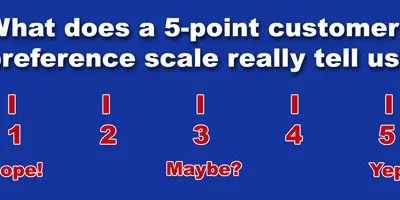What’s In It For Me Under Attack By Nobel Prize Winner
Posted on16 Oct 2017
Tagsaltruism, behavioral economics, change management, context, cooperation, Cooperation vs Self-interest Series, self-interest, team building, Nobel Prize, Richard Thaler
Comments3
What’s In It For Me is a trite, popular slogan for the average professional driving change. It assumes that people will only... Read More
Five Point Scales Misleading You On Predicting Consumer Behaviors?
Five point scales show up everywhere. They often mislead people though. It’s especially true when people use them to make predictions. Predicting... Read More
Economics, Illogical or Irrational?
Once upon a time, long, long ago, a successful retail executive confided that in college she didn’t do well in economics. She... Read More
Personalities Lurk Behind Twitter Streams
Posted on25 Jul 2013
TagsThe Economist, Google, logic, marketing, merchandising, neoclassical economics, Personality, politics, rational actor theory, relationships, free will, Twitter, Bloomberg Businessweek, Joshua Green, Eric Schmidt, Barack Obama, seed planting analogy, personality as software analogy, advertising, behavioral economics, business, computers, decisions, education
Comments0
Increasingly, we are seeing the connection between all that we do and our personalities. Why is this “groundbreaking?” For centuries now, we’ve... Read More
America’s Faith-based Economy
Posted on22 Apr 2013
TagsAmerican, behavioral economics, money, neoclassical economics, objectivity, personal, religion, The Economist, Poland, faith-based economy, United States
Comments0
When I read articles like “Toss a Coin” (The Economist, January 12, 2013 edition), I’m reminded that our economy relies on faith.... Read More
Your Brain, the Final Frontier
Posted on08 Apr 2013
Tagshumans, Human Genome Project, American Association for the Advancement of Science, Brain Mapping Analogy, The Economist, technology, Star Trek, rational actor theory, Management by objective, management, knowledge, genetic code, free will, emotions, context, conditionality, brain, biology, behavioral economics
Comments0
“Space, the final frontier” introduced Star Trek’s original series, but assessments of our human knowledge indicate that the space between our ears... Read More
People Eat Escargot, Not Snails
Posted on05 Apr 2012
Tagsproblem solving, analogy collection, words, word choice, The Economist, taste, Roget's Thesaurus, rational actor theory, phraseology, food, emotions, decisions, connotations, behavioral economics
Comments3
The research behind behavioral economics is full of emotional solutions to everyday problems. By tapping into the emotional biases behind our decisions,... Read More
Accounting for Unconscious Biases in Your Decision Making?
Posted on16 Dec 2010
Tagsabilities, unknown, uncertainty, self-interest, optimism, Olivier Sibony, McKinsey & Company, management, leadership, economics, diversity, dissent, decisions, Dan Lovallo, budgets, behavioral economics
Comments0
The article, The Case for Behavioral Strategy, (PDF) by Dan Lovallo and Olivier Sibony* from the March 2010 McKinsey Quarterly states: Once... Read More




